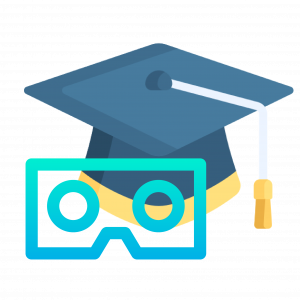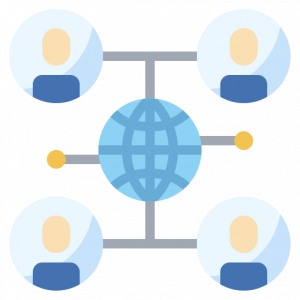Digital Solutions for Education & Research
The future is increasingly digital — a trend changing how education is facilitated, administered, and delivered in the classroom. Technology can inspire us to discover breakthroughs in innovation and education, but digitalisation is not an end in itself. We develop technology to solve meaningful problems for educators, students, researchers and the support structure surrounding them.
Within this theme, we have four focus areas:
- Tools for Blended Learning
- Data Analytics
- XR for Education & Research
- Ethical & Inclusive Technology
Tools for Blended Learning
 Blended learning promises to combine the best of the digital environment and the best of the classroom environment to provide both structure and flexibility for learners. Technology can play a key supporting role in designing education to be both in-person and remote, both live and asynchronous. The technological landscape is always changing, and new developments create opportunities to rethink how blended learning can be delivered in different disciplines.
Blended learning promises to combine the best of the digital environment and the best of the classroom environment to provide both structure and flexibility for learners. Technology can play a key supporting role in designing education to be both in-person and remote, both live and asynchronous. The technological landscape is always changing, and new developments create opportunities to rethink how blended learning can be delivered in different disciplines.
In our work, we look toward innovative (digital) solutions for blended learning to investigate how media and technology can change, stimulate, and improve the student’s learning experiences and outcomes. We explore technology by creating and testing prototypes to support a wide variety of learning approaches suited for blended learning. We examine the advantages and disadvantages of different digital tools for blended learning in terms of learning outcomes and generate ideas for educators, learners and researchers. We publish practical resources for teachers and support staff based on the outcomes of our projects, including on the Teaching Support website for Leiden University.
Data Analytics
 We navigate the vast toolbox of advances in AI to assist teachers, students, and researchers. AI could be directly used in the classroom or indirectly through support systems or analysis. We work with the relevant product owner to effectively incorporate these technologies and provide guidance on use and best practices. We use AI including technologies such as Natural Language Processing (understanding text), Computer Vision (understanding images) and Recommender Systems (finding patterns in the data) to support education.
We navigate the vast toolbox of advances in AI to assist teachers, students, and researchers. AI could be directly used in the classroom or indirectly through support systems or analysis. We work with the relevant product owner to effectively incorporate these technologies and provide guidance on use and best practices. We use AI including technologies such as Natural Language Processing (understanding text), Computer Vision (understanding images) and Recommender Systems (finding patterns in the data) to support education.
XR for Education & Research
 Virtual, Augmented, and Mixed Reality (eXtended Reality (XR)) are stimulating and enhancing many aspects of our social life. Beyond video games and leisure, both education and professional environments are pivoting towards new, immersive technologies. This presents many innovative opportunities for enhancing the way people learn, teach, communicate and research, but also comes with challenges. To maximise the benefits offered by XR, in our work we combine knowledge of human cognition, culture and behaviour with a focus on the societal and academic values that provide effective and demand-driven experiences. Our XR projects are guided by three focus areas: the responsible use of XR, creating engaging social interactions and connecting people by building a community. To join and explore our international community focussing on XR in Education (XR ERA), simply click here.
Virtual, Augmented, and Mixed Reality (eXtended Reality (XR)) are stimulating and enhancing many aspects of our social life. Beyond video games and leisure, both education and professional environments are pivoting towards new, immersive technologies. This presents many innovative opportunities for enhancing the way people learn, teach, communicate and research, but also comes with challenges. To maximise the benefits offered by XR, in our work we combine knowledge of human cognition, culture and behaviour with a focus on the societal and academic values that provide effective and demand-driven experiences. Our XR projects are guided by three focus areas: the responsible use of XR, creating engaging social interactions and connecting people by building a community. To join and explore our international community focussing on XR in Education (XR ERA), simply click here.
Ethical & Inclusive Technology
 Developing and integrating new technologies must be done inclusively and ethically. In our work, we make sure that technology supports and fosters the diversity of educators and students. We prioritise ethical and responsible approaches to technology to ensure maximising the opportunities whilst minimising the risks. We support adaptive, creative technological solutions for challenges to diversity, equality, and inclusion and take an ethical and responsible approach to privacy and protection. Also, we offer advice on technological solutions and their implementation in and outside of the classroom.
Developing and integrating new technologies must be done inclusively and ethically. In our work, we make sure that technology supports and fosters the diversity of educators and students. We prioritise ethical and responsible approaches to technology to ensure maximising the opportunities whilst minimising the risks. We support adaptive, creative technological solutions for challenges to diversity, equality, and inclusion and take an ethical and responsible approach to privacy and protection. Also, we offer advice on technological solutions and their implementation in and outside of the classroom.
Tools and Services
Want to learn more about our work to develop Digital Solutions for Education & Research?
At the Centre, we use methodological approaches, research-based methods and best practices to offer you tailor-made digital solutions, no matter what educational field you work in. “Solutions aren’t inclusive if they are exclusive.”
People: We train and advise educators, researchers and project teams on context-specific applications of technology to enhance teaching and learning.
Process: We work with educational institutions to map innovation pathways for new technology and advise on structural implementation for new or changing technologies.
Technology: We work in multidisciplinary teams to build prototypes as well as test and determine what education technology is most effective and beneficial for specific contexts. When implementing, building or testing technology, we start with the educational challenge and build or adapt a digital solution to best fit the needs of learners.
GET IN TOUCH
Reach out to us if you want to learn more or are interested in one of our workshops.
How we put people first
Our experts are committed to user-centred design. We take a holistic, multidisciplinary approach to identify and solve problems by rethinking ways of working, implementing technology, building applications, running workshops and giving policy advice. By taking a critical eye towards the problem we’re trying to solve, we prioritise user experience throughout every project lifecycle.


